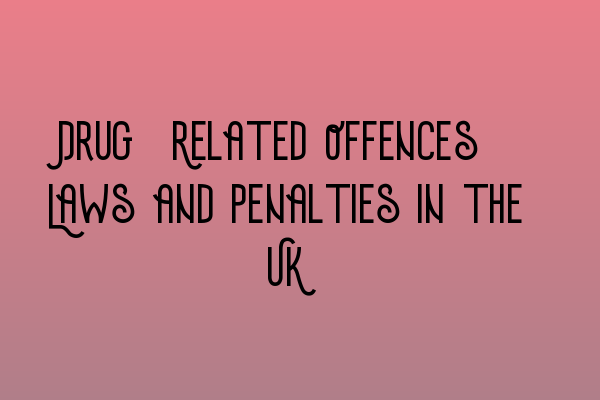Drug-Related Offences: Laws and Penalties in the UK
Welcome to SQE Criminal Law & Practice Law UK, your trusted source for legal information and assistance. In this blog post, we will delve into the complex world of drug-related offences in the United Kingdom. Whether you are studying for your SQE exams or simply want to increase your knowledge of criminal law, this article will provide a comprehensive overview of the laws and penalties surrounding drug offences.
Understanding Drug Offences
Drug offences are considered serious criminal offences in the UK, attracting strict penalties and punishments. The Misuse of Drugs Act 1971 is the primary legislation governing drug-related offences in the country. This legislation categorizes drugs into different classes, ranging from Class A to Class C, with Class A being the most serious and Class C being the least serious.
Common examples of Class A drugs include heroin, cocaine, ecstasy, and LSD. Class B drugs include cannabis, amphetamines, and ketamine. Class C drugs include anabolic steroids, tranquilizers, and some types of prescription medications. The classification of a drug determines the level of punishment a person may receive if found guilty of possessing, supplying, or producing that particular drug.
If you are studying for your SQE exams, it is important to have a clear understanding of the classification of drugs and their associated penalties. Our SQE 1 Practice Exam Questions and SQE 1 Practice Mocks FLK1 FLK2 articles can help you test your knowledge and prepare effectively for the exam.
Laws Surrounding Drug Possession
Possession of illegal drugs is a criminal offence in the UK. If found in possession of a controlled substance, you can face serious legal consequences. The severity of the punishment depends on various factors, such as the type and quantity of the controlled substance, the intent behind the possession, and the defendant’s previous criminal record.
For Class A drugs, possession can result in up to seven years in prison and/or an unlimited fine. Possession of Class B drugs can lead to up to five years in prison and/or an unlimited fine. Possession of Class C drugs can result in up to two years in prison and/or an unlimited fine.
It is important to note that the penalties mentioned above are merely a guideline, and the actual punishment may vary depending on the circumstances of the case. Consulting with a qualified criminal defence solicitor is crucial if you are facing drug possession charges in order to understand your legal rights and options.
Supply and Production of Drugs
Supplying, distributing, or producing drugs is treated extremely seriously in the eyes of the law. The penalties for drug supply and production offences are significantly harsher than those for possession. If found guilty of supplying or producing drugs, you can face lengthy prison sentences and substantial fines.
For Class A drugs, the maximum penalty for supply or production is life imprisonment and/or an unlimited fine. Class B drugs carry a maximum penalty of fourteen years in prison and/or an unlimited fine. For Class C drugs, the maximum penalty is up to fourteen years imprisonment and/or an unlimited fine.
If you need assistance with SQE Criminal Law & Practice Law UK exams or want in-depth knowledge regarding drug supply and production offences, our comprehensive SQE 2 Preparation Courses can provide you with the necessary guidance and resources.
Legal Assistance for Drug Offences
Being charged with a drug-related offence can have serious implications for your future. It is essential to seek professional legal assistance from an experienced criminal defence solicitor who specializes in drug offences. A skilled solicitor can help build a strong defence strategy, guide you through the legal process, and fight for your rights.
If you are undergoing preparation for your SQE exams or require comprehensive legal guidance regarding drug-related offences, our expert team at SQE Criminal Law & Practice Law UK is here to assist you. Our SQE 1 Preparation Courses can provide you with the necessary knowledge and skills required for a successful legal career.
Stay Informed with SQE Criminal Law & Practice Law UK
Understanding drug-related offences and their legal implications is crucial for anyone studying criminal law or working within the legal profession. Stay up to date with the latest legal developments and examination resources by regularly visiting our website.
For more information on upcoming SQE exam dates, visit our SRA SQE Exam Dates page.
Remember, knowledge is power, and our team is here to equip you with the knowledge and skills you need to succeed in your legal career. Stay connected with SQE Criminal Law & Practice Law UK and unlock your full potential.
